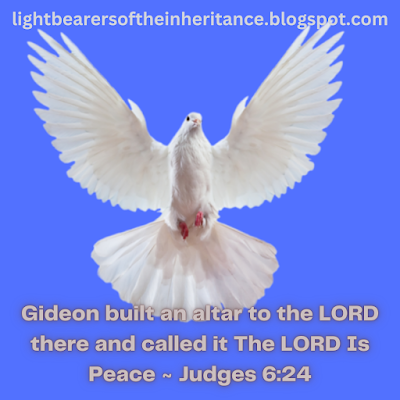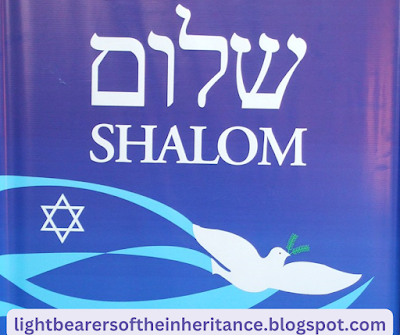Here at the Lightbearers of the Inheritance blog we are taking a deeper look at the compound names of God, their meanings, and how they apply to believers today. This inspirational journey has transformed my prayer life, and encouraged my faith walk. I hope it has done the same for yours. Today’s post delves into Jehovah Shalom's meaning. To start, we first need to talk about our relationship with God so it all makes sense.
Relationship with God
In the how do we praise the name of God post, we learned that God’s name YHWH or JHVH (today articulated as Yahweh or Jehovah) is the Hebrew name revealed to Moses in the book of Exodus at the burning bush. It means “the becoming one” or “I am” and is a name by which God reveals his desired relationship with you.
God underscored his desire for relationships from the beginning. We see it in the book of Genesis, in the garden with Adam and Eve. He enjoyed interacting (fellowship) with them. Once sin entered the scenario through their disobedience that relationship was broken.
Since then, God has worked to reveal himself and bring us back into a relationship with himself. With that understanding, let’s look at the compound name Jehovah Shalom, where it is found in Scripture, and what it meant then and what it means now. First, let's look at the word shalom in Hebrew.
Shalom in Hebrew
Before we go to the Hebrew, ask yourself what the word Shalom means to you at this moment. I knew that it meant “peace” and that it is a word used to say hello and goodbye, but I learned it is deeper than that.
With upheaval in the world today, some might think it means hoping for no more war, no more stress, or no more problems. A similar-sounding Arabic word (Salam) does refer to hope for world peace and the end of war, but the meaning of the Hebrew word Shalom is more than that. It can refer to the absence of war, but its use throughout the Bible, most often involves an inner sense of completeness and tranquility.
Jehovah Shalom meaning
Boiled down this is the Jehovah Shalom meaning: Jehovah (the becoming one) (in his relationship with you) desires to give you a (sense of completeness and tranquility). It is an inner peace, not outward peace that depends on circumstances.
Jehovah Shalom Scripture
In Judges Gideon built and altar to the Lord and called it The LORD is Peace. What were his circumstances? His people were being oppressed by the Midianites who often raided their land and ruined their crops. As a result, we find Gideon threshing grain in a winepress—hiding from the Midianites. But the thing that frightened him was a visit from the angel of the LORD [Yahweh] who said, “The LORD is with you, mighty warrior” (Judges 6:11-23). When Gideon realized he was speaking with the angel of the Lord, he says, “Alas, O Lord God! For now I have seen the angel of the Lord face to face.” He was afraid he was going to die! But, the Lord reassured him. “Peace to you, do not fear; you shall not die.” While Gideon was hesitant to think of himself as a warrior, by the end of the story he builds an altar and calls it Jehovah Shalom, “The LORD is peace.”
Why? In response to the Lord's assurance: “Shalom! Do not be afraid. You are not going to die.” Shalom refers to “completeness, soundness, flourishing, or well-being.” This is possible through a relationship with God. Gideon needed this assurance not because he feared the Midianites, but because he has seen the angel of the Lord face to face and feared death.
What the meaning of Shalom means to us
Instead of thinking of world peace as something we can accomplish, we can look at God’s peace as world changing. If all hearts had a right relationship with God, Shalom would change the world from the inside out. Let us pray hearts would be softened and seek to be in a right relationship to God.
* * * *
Quick reference
to other compound names of the names of God from previous posts:
· Jehovah Jireh (The Lord Will Provide)
· Jehovah Nissi (The Lord My Banner)
· Jehovah-Raah (The Lord My Shepherd)
· Joehvah Rophe (The Lord Who Heals)
· Jehovah Sabaoth (The Lord of Hosts) The Lord of Powers
:











